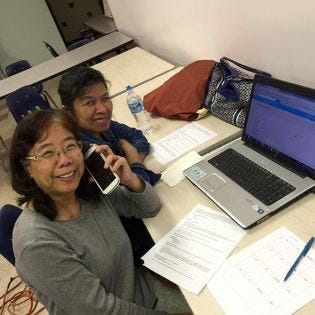As Medicaid unwinds, one woman takes it upon herself to enroll hundreds of community members
Former CPACS worker Anna Tam doesn't want to let her community down.
For the past 11 years, Anna Tam has worked at the Center for Pan Asian Community Services (CPACS) in the social services department. Mostly, she helped people with applying for SNAP (food stamps) and Medicaid renewals, with a focus on Chinese community members. But Anna no longer works at CPACS - she was let go in late February. “[Medicaid] renewal - that [was] my main thing….Because a lot of the immigrants have language barrier[s], so they don't know what is happening in mainstream society,” she said.
Starting April 1st, after a three year pause - the process of re-enrolling and re-determining Medicaid eligibility begins in Georgia. That’s because the federal public health emergency period which was invoked at the start of the pandemic to expand health coverage - is ending.
Some Georgia residents will no longer be eligible for Medicaid - like those who have aged out or those who are unable to provide proof of working or volunteer hours. And eligible Georgia residents have to reapply for Medicaid, or risk losing it. Staff at the Georgia Budget and Policy Institute (GBPI) are focused on giving people a heads up about what they have called a “major healthcare event,” to make sure an unprecedented number of people don’t lose coverage because of “procedural” reasons.
The role of immigrant serving community organizations, like the Latin American Association and CPACS, is key to getting the word out and assisting people with Medicaid enrollment, says Crystal Munoz, Immigration Policy Analyst at GBPI.
This year, at least on the CPACS side, that capacity isn’t there.
The 42 year old organization lost federal funding after its senior leadership and Board came under investigation for alleged fraud and mismanagement last year. Before that, CPACS would have had a staff that was assisting hundreds of community members with SNAP applications and Medicaid renewals in multiple languages.
Now, says Stephen Lee, CPACS Acting CEO, they have just two Korean staff members who will be focused on assisting Korean seniors with their Medicaid re-enrollments. “Numbers wise we have a lot less,” he said, “because of the limited funding.” There is no more staff to assist Spanish speaking community members, says Lee, so they’ll be referring them to other community organizations.
Anna says she used to help at least a couple hundred Chinese community members with their Medicaid renewals at CPACS. She doesn’t want those people to fall through the cracks just because she isn’t officially working with the organization anymore. “I'm the only one who knows what to do with Medicaid and for SNAP. So I will do it by myself.”

She plans to assist more than 500 people with applications through her capacity as a volunteer at the Chinese Community Federation of Atlanta, she said. It’s a lot, so she’s encouraging some people to set up their accounts on the online platform themselves. “For those who know English, they may be able to do it themselves, but sometimes it may be a little bit complicated for them. And if they cannot do it, I’ll still help them.”
Since Anna doesn’t have an office anymore, she’ll be coordinating mostly over the phone and text message, which isn’t ideal. “Most of them they [came] to CPACs, which [was] easier because they can bring their documents and then I make copies.”
Each client had a file folder with all their documents. She no longer has those files, or access to the online portal she had through CPACS. So she has to begin anew. “Now because I don't have that access, I have to create an account for each client.”




